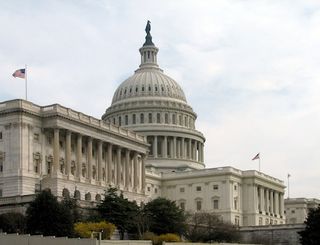New Bill Would Allow Overbuilding of up to 1 Gig Service

Democrats have released the text of their massive ($1.5 trillion-plus) infrastructure bill, the Moving Forward Act, that would allocate billions to subsidize broadband competition--including from municipal providers--in "underserved" areas which according to the Dems could mean where service is already provided by private capitol at just short of gig speeds.
The bill would allocate $60 billion to overbuild service the FCC now considers high-speed ("low-tier" service that can be overbuilt with that money includes anything under 100 Mbps). And if there is no service under 100 Mbps, a state could actually use it to overbuild service under 1 Gig.
The definition of broadband service is at least 25 mbps downstream and 3 up--currently the FCC's working definition of high-speed--and at "a latency that is sufficiently low to allow real-time, interactive applications. Underserved varies widely, and can potentially be defined as amount of competition or price.
The Moving Forward Act (specifically its INVEST in America section), would appropriate $100 billion for "Affordable" broadband to "Get children connected to remote learning, close broadband adoption and digital skills gaps and enhance payment support for low-income households and the recently unemployed."
It creates a $5 billion boost to E-rate funding (5% of which is reserved for tribal lands) for WiFi hotposts, connected devices and other equipment for schools and libraries. The money could also be used for wired and wireless connections at home given the COVID-19-related need for distance learning.
The bill has a "dig once" provision to coordinate transportation and broadband infrastructure projects while "preventing unfunded mandates. That includes creating a "Dig Once Funding Task Force to estimate the cost of a nationwide “dig once” requirement, and to propose and evaluate options for funding such a requirement."
Related: Dig Once Bill Makes Second Appearance
Multichannel Newsletter
The smarter way to stay on top of the multichannel video marketplace. Sign up below.
The bill would establish an Office of Internet Connectivity and Growth within the National Telecommunications and Information Administration (NTIA), the White House's chief communications policy advisory arm. The office would do outreach to communities that "need access to broadband service and improved digital inclusion activities." It would also track broadband buildouts funded by federal dollars. The FCC, for example, would be required to provide information on how Universal Service Funds are being spent and the economic impact of the program, as would the Department of Agriculture on its rural broadband buildout subsidy program.
The FCC would also have to team up on a biennial study of the degree to which cost is a barrier to adoption.
Congress recently rolled a number of FCC studies into one. This bill would definite ramp up the studies and reporting requirements.
The bill would streamline the application process for broadband subsidy programs. The current FCC is all about cutting red tape, but also about insuring that the process is not so easy that it lends itself to waste, fraud and abuse.
On the municipal broadband front, the bill would create a State Digital Equity Capacity Grant Program "to promote the achievement of digital equity, support digital inclusion activities, and build capacity for efforts by States relating to the adoption of broadband service by residents of those States."
Related: GOP Leaders Offer Broadband Framework
Cities, towns, schools and nonprofits would all be eligible for grants.
Other highlights:
1) The FCC would have to come up with standard "consumer labels" for ISPs to disclose price and terms of service offerings.
2) The FCC would get $24 million to collect better broadband availability data, which was required under the BROADBAND DATA Act. FCC chairman Ajit Pai has been calling on Congress to provide the funds it needs to do that.
3) The FCC would have to update the E-rate rules to fund WiFi on school buses.
The overall bill is unlikely to make much headway in the Republican-controlled Senate given its massive spending for a bunch of programs, including combating climate change and the broadband section's support for municipal broadband overbuilds or underserved areas. That would be the case particularly if price is determined to be one of the barriers money can go toward surmounting. Republicans are also unlikely to be drawn to its proliferation of new reports to Congress. But if the Senate changes hands in November, it could be another story.
Contributing editor John Eggerton has been an editor and/or writer on media regulation, legislation and policy for over four decades, including covering the FCC, FTC, Congress, the major media trade associations, and the federal courts. In addition to Multichannel News and Broadcasting + Cable, his work has appeared in Radio World, TV Technology, TV Fax, This Week in Consumer Electronics, Variety and the Encyclopedia Britannica.

